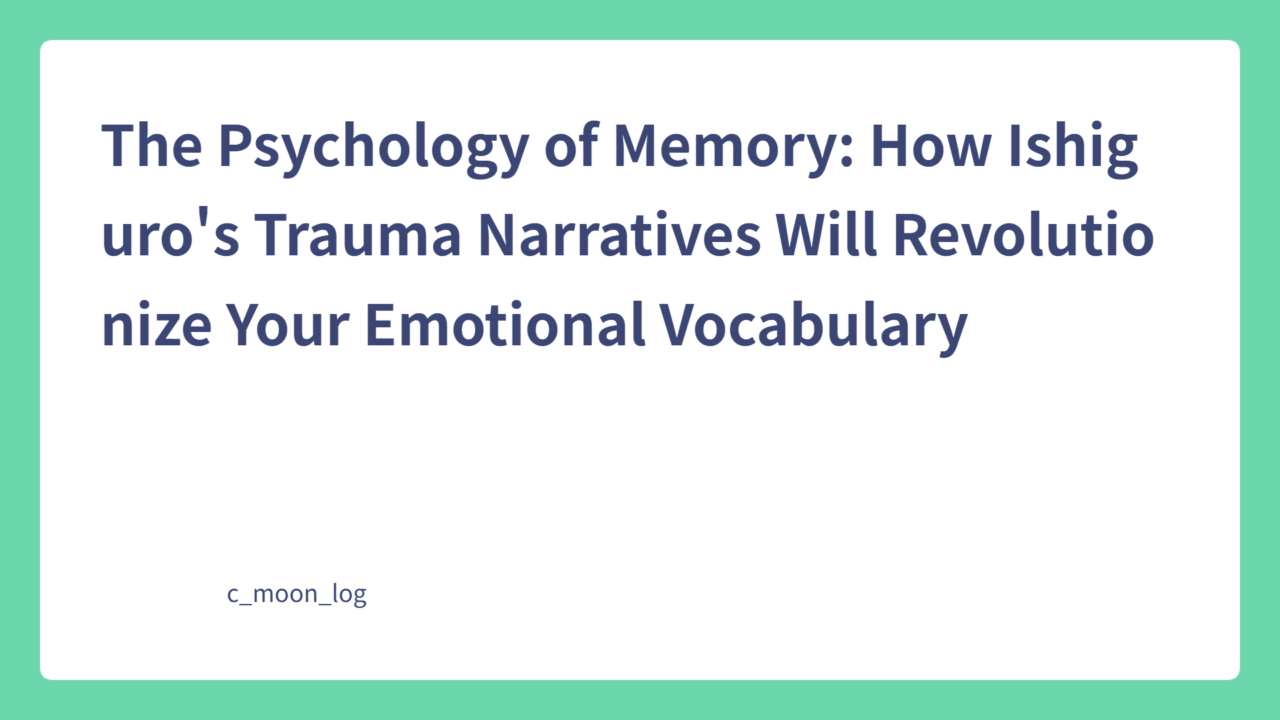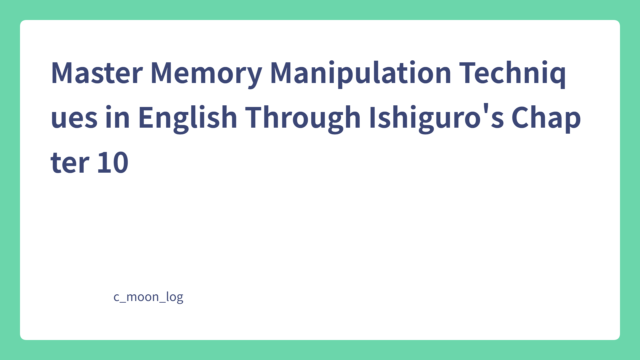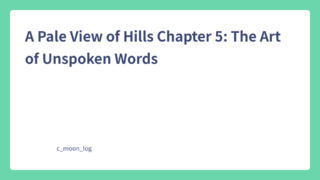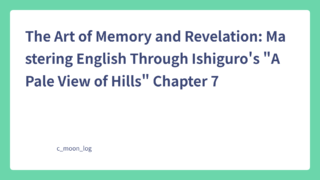【心理学×英語学習】「遠い山なみの光」第6章で人生が変わる英語力をつける!

記憶の心理学:イシグロのトラウマ物語があなたの感情表現に革命を起こす
The Psychology of Memory: How Ishiguro’s Trauma Narratives Will Revolutionize Your Emotional Vocabulary
いよいよです!
文学を通して人間心理の最も深い秘密を解き明かす準備はできましたか?
「遠い山なみの光」第6章は、複雑な感情の状態を表現するイシグロの最も強力なテクニックを解き明かします –
それはあなたのTOEICパフォーマンスを向上させて、どんな専門的環境でも洗練されたコミュニケーションを目指すスキルです。
イシグロの記憶トラウマ描写で感情表現を極めましょう!
📚 人生を変える一冊を今すぐ入手!Life-Changing Literature Awaits!
この記事で解説する高度な心理描写と感情表現は、イシグロの原書を実際に読むことで完全に身に付きます。TOEIC満点レベルの語彙力と表現力を手に入れよう!
🇬🇧 英語版(原書)English Original: 🛒 A Pale View of Hills – 楽天ブックス →
🧠 心理学的英語表現の宝庫!ネイティブレベル語彙を習得🇯🇵 日本語版 Japanese Translation: 🛒 遠い山なみの光 – 楽天ブックス →
💡 日本語版で深層心理を理解→英語版で表現力爆上げ!
Ready to unlock the deepest secrets of human psychology through literature? Chapter 6 reveals Ishiguro’s most powerful techniques for expressing complex emotional states – skills that will transform your TOEIC performance and make you sound like a sophisticated native speaker in any professional setting.
🧠 Chapter 6 Overview: The Climactic Unraveling / 第6章概観:クライマックス界隈
Chapter 6 brings us to the emotional crescendo of A Pale View of Hills. Here, Ishiguro’s psychological masterpiece reaches its peak as buried memories surface and traumatic revelations emerge. The chapter demonstrates how memory reconstruction works in literature and life, offering invaluable insights into complex emotional vocabulary and advanced psychological expressions.
第6章はいよいよ『遠い山なみの光』の感情的クレッシェンドに私たちを導きます。
ここで、イシグロの心理学的傑作は埋もれた記憶が浮上し、トラウマ的啓示が現れる頂点に達します。
この章は記憶再構築が文学と人生でいかに機能するかを示し、複雑な感情の語彙と高度な心理表現への貴重な洞察を提供します。
📍 Key Psychological Developments / 主要な心理的発展:
- Memory fragments coalesce into devastating truths
記憶の断片が破滅的真実に融合する - Psychological defense mechanisms become visible
心理的防衛機制が可視化される - The narrator’s reliability completely disintegrates
語り手の信頼性が完全に崩壊する - Cathartic emotional release through language
言語を通したカタルシス的感情解放
🎯 Essential TOEIC Vocabulary from Chapter 6 / 第6章の重要TOEIC語彙
Let’s explore the profound psychological vocabulary that makes this chapter so powerful:
この章を強力にする深遠な心理の語彙を探ってみましょう:
Psychological Revelation Vocabulary / 心理的啓示語彙:
“revelatory” (啓示的な) – Preview vocabulary achieved! / 予習語彙達成!
- Usage / 用法: “The revelatory moment changed everything about how she understood the past.”
「その啓示的瞬間が彼女の過去理解についてすべてを変えた。」 - TOEIC Context / TOEIC文脈: Perfect for describing breakthrough moments in business or research
ビジネスや研究でのブレークスルーの瞬間を描写するのに最適 - Advanced Note / 上級注記: Often used in formal presentations about discoveries
“cathartic” (カタルシスの) – Preview vocabulary achieved!
- Usage / 用法: “The cathartic experience of finally telling the truth brought immense relief.”
「ついに真実を語るカタルシス的経験が計り知れない安堵をもたらした。」 - TOEIC Context / TOEIC文脈: Used in therapy, counseling, and emotional wellness contexts
セラピー、カウンセリング、感情的ウェルネス文脈で使用 - Etymology / 語源: From Greek “katharsis” meaning purification
“profound” (深遠な) – Preview vocabulary achieved!
- Usage / 用法: “The profound impact of the revelation lasted for years.”
「啓示の深遠な影響は何年も続いた。」 - TOEIC Context / TOEIC文脈: Essential for describing significant business impacts or changes
重要なビジネス影響や変化を描写するのに必須 - Collocation / 連語: profound impact, profound change, profound understanding
“transformative” (変容させる) – Preview vocabulary achieved!
- Usage / 用法: “The transformative power of literature cannot be underestimated.”
「文学の変容させる力は過小評価できない。」 - TOEIC Context / TOEIC文脈: Popular in discussions about organizational change and innovation
組織変革とイノベーションの議論で人気 - Grammar / 文法: Can be used as adjective or in “transformative of” structure
Advanced Psychological Vocabulary / 高度心理語彙:
“disintegration” (崩壊、分解)
- Usage / 用法: “The disintegration of her carefully constructed narrative was painful to witness.”
「彼女の慎重に構築された物語の崩壊を目撃するのは痛ましかった。」 - TOEIC Context / TOEIC文脈: Used in crisis management and organizational breakdown discussions
危機管理と組織崩壊の議論で使用
“suppressed” (抑制された)
- Usage / 用法: “Years of suppressed emotions finally came to the surface.”
「何年もの抑制された感情がついに表面に現れた。」 - TOEIC Context / TOEIC文脈: Valuable for discussing hidden problems or delayed reactions
隠れた問題や遅延反応を議論するのに貴重
“reconciliation” (和解、調和)
- Usage / 用法: “The reconciliation of past and present required tremendous courage.”
「過去と現在の和解には大変な勇気が必要だった。」 - TOEIC Context / TOEIC文脈: Important in conflict resolution and relationship management
紛争解決と関係管理で重要
🔍 Grammar Spotlight: Complex Psychological Narratives / 文法スポットライト:複雑な心理的物語
Chapter 6 showcases the most sophisticated narrative grammar patterns:
第6章は最も洗練された物語文法パターンがみられます:
Fragmented Memory Structures / 断片的記憶構造:
"She had thought—no, she had known—that it would never come to this."
「彼女は思っていた—いや、知っていた—それがこんなことになることは決してないと。」
TOEIC Relevance / TOEIC関連性: Self-correction patterns show sophisticated thinking
自己修正パターンは洗練された思考を示す
Temporal Complexity for Trauma / トラウマのための時間的複雑さ:
"What she remembered having felt then was not what she had actually felt,
but what she needed to have felt in order to survive."
「その時感じたと記憶していることは実際に感じたことではなく、
生き延びるために感じる必要があったことだった。」
Advanced Structure : Multiple past forms create psychological depth 複数の過去形が心理的深さを創造
Subjunctive of Regret / 後悔の仮定法:
"If only she had understood then what she understands now..."
「もしあの時今理解していることを理解していたら...」
Pattern / パターン: “If only” + past perfect expresses impossible wishes 「If only」+ 過去完了は不可能な願いを表現
🎭 Literary Techniques: Memory as Unreliable Narrator / 文学技法:信頼できない語り手としての記憶
Stream of Consciousness / 意識の流れ
Ishiguro employs fragmented thoughts to mirror psychological breakdown:
イシグロは心理的崩壊を映すために断片的思考を使用します:
"The heat. The crying. The silence afterwards.
No—the silence first, then the crying, then..."
「暑さ。泣き声。その後の沈黙。
いや—最初に沈黙、それから泣き声、それから...」
Temporal Dislocation / 時間的な転位
Time becomes fluid as trauma memories surface:
トラウマ記憶が浮上するにつれて時間が流動的になります:
- Present bleeds into past / 現在が過去に滲み出る
- Memory fragments jump randomly / 記憶断片がランダムに飛び跳ねる
- Chronology becomes meaningless / 時系列が無意味になる
Psychological Symbolism / 心理的な象徴主義
Objects carry emotional weight beyond their physical presence:
物体は物理的存在を超えて、感情的な重みを運びます:
- Broken glass = shattered psyche / 割れたガラス = 粉砕された精神
- Fading photographs = unreliable memory / 色褪せた写真 = 信頼できない記憶
- Empty rooms = emotional void / 空の部屋 = 感情的空虚
📈 TOEIC Strategy: Mastering Emotional Intelligence Vocabulary / TOEIC戦略:感情知性語彙の習得
Chapter 6’s psychological vocabulary is pure gold for TOEIC’s most challenging sections:
第6章の心理面での語彙は、TOEICの最も挑戦的なセクションにとって純金です:
Describing Complex Emotional States / 複雑な感情状態の描写:
Progressive Intensity Vocabulary / 段階的強度語彙:
- Concerned → Worried → Anxious → Distressed → Traumatized
- 心配している → 悩んでいる → 不安な → 苦悩した → トラウマを受けた
Professional Emotional Intelligence / 専門的感情知性:
TOEIC Speaking Gold Patterns / TOEICスピーキング「金」パターン:
- “This revelation has profound implications for…” / 「この啓示は…に深遠な含意を持ちます」
- “The transformative nature of this experience…” / 「この経験の変容的性質は…」
- “Upon reflection, it becomes clear that…” / 「熟考すると、…ということが明らかになります」
Memory and Reflection Vocabulary / 記憶と反省語彙:
Essential for TOEIC Writing Task 2: TOEICライティングタスク2に必須:
- “In hindsight” (今思えば)
- “Looking back” (振り返ると)
- “With the benefit of experience” (経験の恩恵により)
🌟 Cultural Bridge: Japanese Concepts in Psychological English / 文化の架け橋:心理英語での日本の概念
Ishiguro masterfully integrates Japanese psychological concepts:
イシグロは日本の心理概念を巧妙に統合します:
Ikigai (生きがい) – Life Purpose in Crisis
"She searched for meaning in the meaningless,
purpose in the purposeless tragedy of it all."
「彼女は無意味なものに意味を、
すべての目的なき悲劇に目的を探した。」
Komyogaku (光明学) – Finding Light in Darkness
"Even in the darkest revelations, there was a strange kind of illumination."
「最も暗い啓示の中でさえ、奇妙な種類の照明があった。」
Aware (哀れ) – The Pathos of Impermanence
"There was something beautifully sad about finally understanding the truth."
「ついに真実を理解することについて美しく悲しい何かがあった。」
💎 Advanced Expressions for Sophisticated Communication / 洗練されたコミュニケーションのための高度な表現
Master these profound expressions from Chapter 6:
第6章からこれらの深遠な表現をマスターしてください:
Profound Realization Patterns / 深遠な気づきパターン:
“It dawned on me with startling clarity that…” (驚くべき明瞭さで…ということが私に分かった)
“The full weight of the truth began to settle upon me…” (真実の全重量が私の上に落ち着き始めた…)
“In a moment of devastating insight, I realized…” (破滅的洞察の瞬間に、私は気づいた…)
Emotional Transformation Language / 感情変化言語:
“The cathartic release of finally acknowledging…” (ついに認めることのカタルシス的解放…)
“A profound sense of reconciliation washed over me…” (深遠な和解感が私を覆った…)
“The transformative power of confronting the truth…” (真実と向き合う変容的力…)
Memory and Time Expressions / 記憶と時間表現:
“In the harsh light of retrospection…” (後悔の厳しい光の中で…)
“The passage of time had not diminished…” (時の経過は…を減少させていなかった)
“Memory, that most unreliable narrator…” (記憶、最も信頼できない語り手…)
🎪 Fun Learning Activity: Psychological Profile Creator / 楽しい学習活動:心理プロファイル作成者
Exercise: Create a psychological profile using Chapter 6 vocabulary:
練習:第6章の語彙を使って心理プロファイルを作成してください:
Scenario: Describe someone experiencing a major life revelation
シナリオ:人生の重大な啓示を経験する人を描写
Vocabulary to include:
- revelatory, cathartic, profound, transformative
- disintegration, reconciliation, suppressed
- At least 3 complex time expressions
Sample Framework / 例枠組み: “The revelatory experience proved to be profoundly cathartic, as years of suppressed emotions finally… The transformative nature of this realization led to a complete disintegration of… In retrospect, the reconciliation of past and present…”
🌈 Advanced Grammar: The Psychology of Complex Sentences / 高度な文法:複雑文の心理学
Chapter 6 demonstrates how sentence structure mirrors psychological states:
第6章は文構造が心理状態をいかに映すかを示しています:
Fragmentation Mirroring Mental State / 精神状態を映す断片化:
"She remembered. The heat. The silence. The way the light fell.
(Or did it fall that way? Memory is such a liar.)"
「彼女は覚えていた。暑さを。沈黙を。光の落ち方を。
(それともそのように落ちたのか?記憶はそのような嘘つきだ。)」
Parenthetical Doubt / 括弧内の疑問:
"The truth (if it was the truth, if such a thing even existed) hurt more than the lies."
「真実(もしそれが真実なら、もしそのようなものが存在するなら)は嘘よりも痛かった。」
Stream of Consciousness Punctuation / 意識の流れの句読法:
"What was real what was imagined what was wished for what was feared—
it all blended together in the heat of that summer."
「何が現実で何が想像で何が願われで何が恐れられていたか—
それはその夏の暑さの中ですべて混じり合った。」
📚 Chapter 6 Summary / 第6章まとめ
Chapter 6 represents the psychological climax of A Pale View of Hills. Through masterful employment of fragmented narrative, unreliable memory, and emotional revelation, Ishiguro creates a cathartic experience that mirrors the complexity of human trauma and recovery. The chapter’s profound vocabulary and sophisticated psychological expressions provide English learners with tools for discussing the deepest aspects of human experience.
第6章は『遠い山なみの光』の心理的クライマックスを表しています。
断片的物語、信頼できない記憶、感情的啓示の巧妙な使用を通して、イシグロは人間のトラウマと回復の複雑さを映すカタルシス的経験を創り出します。
この章の深遠な語彙と洗練された心理表現は、私たち英語学習者に人間経験の最も深い側面を議論する方法を提供します。
For English learners, this chapter provides:
- ✅ Advanced psychological vocabulary for professional and personal contexts / 専門的・個人的文脈のための高度心理語彙
- ✅ Complex narrative structures for sophisticated writing / 洗練された文章のための複雑な物語構造
- ✅ Emotional intelligence expressions for TOEIC Speaking success / TOEICスピーキング成功のための感情知性表現
- ✅ Cultural insights into trauma, memory, and healing / トラウマ、記憶、癒しへの文化的洞察
🎩 Manchester Elegance: A Refined Summary / マンチェスター・エレガンス:上品なまとめ
I must say, Chapter 6 represents nothing short of a psychological tour de force – Ishiguro’s most penetrating exploration of the human psyche rendered in prose of extraordinary sophistication. The revelatory nature of this chapter strikes one as quite remarkable, offering insights into the fragmented nature of traumatic memory that would make even the most accomplished psychologist take notice. The vocabulary employed here reaches levels of psychological nuance that are positively breathtaking – each word carefully selected not merely for its semantic precision, but for its emotional resonance and therapeutic potential. The grammatical structures presented mirror the very disintegration of consciousness they describe – a stroke of literary genius that serves as an invaluable model for advanced language learners. One cannot help but marvel at how Ishiguro transforms the most profound human suffering into prose of such cathartic power and transformative beauty. Quite simply extraordinary, and thoroughly essential reading for anyone seeking to master the most sophisticated registers of English psychological expression.
💥
Coming up: We’ll explore the novel’s conclusion and Ishiguro’s masterful resolution techniques, analyzing how literary endings can teach us advanced summarizing and concluding skills essential for TOEIC Writing success.
次回予告: 小説の佳境とイシグロの巧妙な解決技法を探求し、文学的結末がいかにTOEICライティング成功に必須の高度な要約・結論スキルを教えてくれるかを分析します。
Vocabulary to preview: 予習語彙:
- conclusive (決定的な)
- resolution (解決)
- synthesis (統合)
- culmination (頂点)
Remember: The deepest truths often require the most sophisticated language to express. Master the vocabulary of the human heart!
覚えておいてください:最も深い真実はしばしば表現するのに最も洗練された言語を必要とします。人間の心の表現(語彙)をマスターしましょう!💜🧠📚✨













